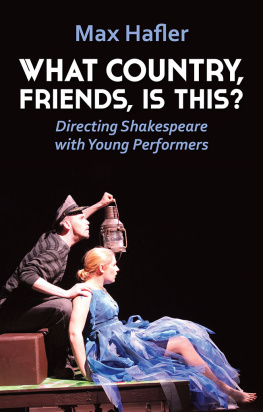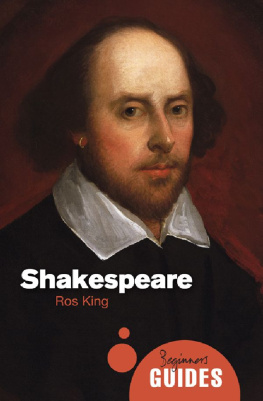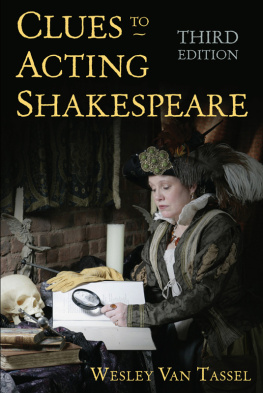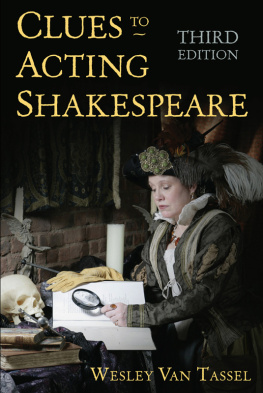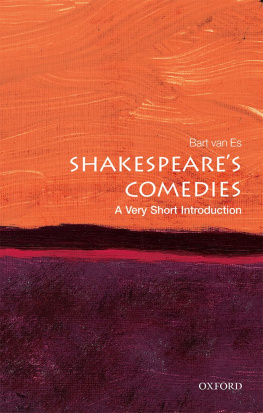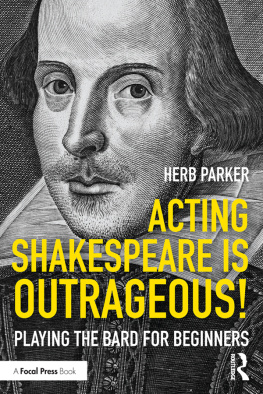WHAT COUNTRY, FRIENDS, IS THIS?
Directing Shakespeare with Young Performers
Max Hafler

NICK HERN BOOKS
London
www.nickhernbooks.co.uk
Preface
You will find that, when it comes to acting and directing, I am a curious mixture of freedom and discipline. It is not always the discipline that should come first either. Sometimes spontaneity, imagination, openness and instinct need to predominate before you start learning about dealing with all the other technical attributes that enable good performance. It took me many years to realise that discipline and spontaneity need to be symbiotic. Acting is a strange thing; one of the things that attracted me to it as a child was that you didnt need to learn how to do anything before you could try it out, unlike the painstaking discipline of playing a musical instrument for instance. However, without some discipline and skill, performing Shakespeare is very challenging.
Working with young people on Shakespeare can produce incredible results, which is often, in many respects, better than work from professional companies. Too often for me, professional actors performing Shakespeare carry the great weight of history on their backs, a kind of cynical exhaustion which says, Yes, I know you have seen and heard this a thousand times. They often do not play with freshness nor remember that their audience may not have seen the play. This problem is often compounded by conceptual directing where actors are manoeuvred into a concept rather than encouraged to respond creatively.
Of course, in some areas your young actors will not be as strong as a trained professional group, you will not have the same budget, the same talent pool, the same skills, the same amount of rehearsal time nor the same level of life experience. However, what you will have is an incredible energy waiting to be tapped, a strong sense of ensemble often totally lacking within some professional productions and an incredible joy and commitment to performing. If you can guide and support your group and expand these positive areas, at the same time as giving technical support along the way, then you and your group are going to have a great experience whether youre devising a project around a Shakespeare play, looking at some scenes, or mounting a full production.
I sincerely hope that this book will help you guide your young people, in whatever context you approach Shakespeare, whether in class, at youth theatre or at college, into this amazing material from centuries ago, which in many respects is as relevant now as it was then.
The idea that Shakespeare is not for the faint-hearted or only for a privileged few is a myth which still exists today. At the very least there are still many people who consider there are ways of saying and performing it. When I was first introduced to Pucks My mistress with a monster is in love at ten years old, I noticed that it was a lot easier than I thought it would be. Yes, there were some tricky words but the rattling rhythm and excitement of the piece thrilled me. As a young man who played Puck for me decades later in a youth theatre production remarked, I was scared of doing Shakespeare and now Im not. In fact, in many ways, once you get past understanding the language, Shakespeare is easier for young people because it is poetic and out of their immediate reality. It can really free the imagination and take them into new areas of experience.
I have worked as an actor, director, teacher of voice and acting, playwright and writer. Right now, I am working at the National University of Ireland Galway as a teacher in Voice and the Michael Chekhov Technique, in addition to my several varied teaching commitments and directing projects. I also run Chekhov Training and Performance Ireland ( www.chekhovtrainingandperformanceireland.com ), dedicated to promoting the Chekhov work. Much of my directing work has been on classical productions and many of those have been with young people in youth theatres and colleges. My main influence and approach to acting is Michael Chekhov, whose psycho-physical approach I use not only as an acting and directing tool but also to invigorate the imagery of dramatic language which, for me, is absolutely key to success in Shakespeare. Chekhov Technique is physical and visceral. A strong aspect of this work is to actually physicalise the psychology of the characters. Its effect on the text and actor can be very immediate. This physical approach generally works well with young people and can be quite transformational in terms of their capabilities.
Directing young people in Shakespeare requires a holistic approach so this book is not a voice book per se but there are two voice sessions within its pages because without an approach to voice you are going to have problems with Shakespeare. It is not purely a book about directing either, though there are several chapters about that. Nor is this a book solely about Chekhov Technique, as we will be looking at all sorts of methods to bring out the best from your young people.
It is an amalgam of all the above and more.
Acknowledgements
I would like to express my gratitude to:
Matt Applewhite, and all at Nick Hern Books.
To Tony Hegarty, who did the first read-through and edit and whose suggestions, patience, love, support and deep knowledge of teaching has strengthened this book immensely.
To David Zinder, Lenard Petit, Sarah Kane, Sharon Cromwell, Dawn Arnold, Bruce Myers and Jonathan Gunning, for showing me some exercises which I have developed or used in this book.
To Ted Pugh, Joanna Merlin, Fern Sloan, and the other extraordinary teachers of the Michael Chekhov Association and Michael Chekhov Europe.
To Rebecca Bartlett, Niamh Dillon and Andrew Flynn for their encouragement and support of my work at Galway Youth Theatre.
To all at Youth Theatre Ireland for giving me the opportunity to explore voice work with generations of young people all over Ireland.
To Professor Patrick Lonergan and all at the Centre for Drama, Theatre and Performance at the National University of Ireland, Galway, Ireland.
To all the young people who have given permission for their images to be in this book. Participants: Ciara Brady, Fiona Buckley, Patrick Fogarty, Katherine Wheatley, Daniel Murray, Kate OMahony, John Pinel, Nathan Mannion, Ethan Jordan, William Loughnane, Eamon Doran, Mairead Noonan, Pimapsorn Fern Thavornnart, Conor Gormley, Gavin Alcorn Friel.
To Florence Robinson, who taught me voice and acting long before I went to drama school, and to Joyce Morris for her encouragement and support.
To my mother, father and grandmother, who always believed in me.
To Nicole Gervais, Aranos and Jane Talbot who took some of the pictures in this book.
And last but not least, to all the students with whom I have worked, both young and older, particularly on Shakespeare.
Max Hafler
Part One
Our Journey and How to Get There

Introduction
Our Journey
What country, friends, is this?
Twelfth Night: Act One, Scene Two
It has been one of the great joys of exploring Shakespeare with young people to help them discover that it is indeed, for them, even though they can be initially daunted by it.
Young people are often nervous of Shakespeare: bad classroom experiences, a feeling that the language is a barrier and that the plays are too high-brow, boring and so far removed from lifes everyday experience that they seem irrelevant. For directors and facilitators of young actors, it is hard to challenge these assumptions, but it is worth it. In our harshly materialistic environment, you will be opening doors for them into poetic drama and new theatrical worlds. If you are working in school, in addition to assisting with their intellectual understanding of the work and enabling them for exams, you will be giving them a more holistic and deeper understanding of the work.
Next page
